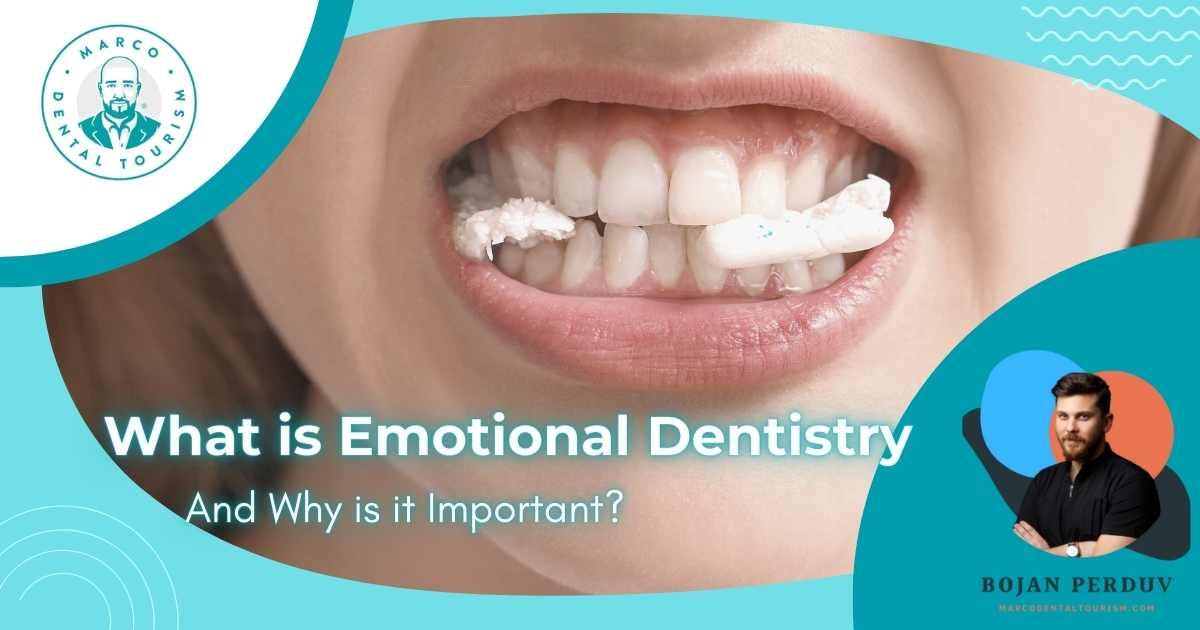What is Emotional Dentistry and Why is it Important?

Did you know that there is a branch of dentistry that deals with the emotional aspect of dental health and visits to the dentist? Today we discover how it is possible to use dental health to gain insight into how we feel, as well as how we can better manage our emotions in order to lead a better quality of life. Welcome to our blog about emotional dentistry - a relatively new and incredibly promising branch of medicine that is still developing alongside the development of general dentistry and its other significant disciplines. In this blog, we introduce all about emotional dentistry, its relevance to modern dentistry and explore the fascinating connection between dental health and our mood, and also discover how emotional dentistry can help us take charge of our emotional well-being.
What is emotional dentistry?

Emotional dentistry is the practice of providing dental care that takes into account the emotional needs of the patient. It focuses on creating a positive experience, providing comfort, relaxation during the treatment, as well as creating mutual trust. It is a holistic approach in which the patient is the center of care.
What emotional states does emotional dentistry study?

Emotional dentistry studies the patient's emotional states such as fear, anxiety, stress and frustration during dental treatments. It seeks to understand how these emotions can affect overall satisfaction with care, as well as how they can be managed to create a pleasant and enjoyable experience.
Mental health and dentistry are connected through the important concept of self-care. Good dental health can have a positive impact on mental health, while poor hygiene leads to stress, fear and anxiety. A beautiful smile contributes to better self-confidence, social interactions and general well-being.
How does emotional dentistry help overcome fear?

Emotional dentistry helps reduce the fear of dental procedures by creating a positive environment and approach to the patient. Through techniques such as deep breathing or relaxing music in the office, dentists can help the patient relieve anxiety and create a pleasant atmosphere.
We present several more great techniques by which emotional dentistry contributes to reducing patients' fear and anxiety:
Talking to the patient: It is important to create an environment of trust, confidence and understanding to help the patient overcome fear. Developing an open dialogue helps to identify the root cause of fear, which significantly contributes to eliminating the consequences and overcoming the patient's nervousness.
Distraction techniques: Using techniques such as listening to soothing music or focusing on breathing help redirect the patient's attention from fear and anxiety to creating an optimistic and carefree attitude.
Relaxation agents: The use of relaxation and sedation agents such as conscious sedation or nitrous oxide help reduce the patient's pain and anxiety. Today's technological advances allow the patient to remain relaxed and completely at ease during the entire dental treatment.
Shorter duration with breaks: Dividing the procedure into shorter parts, as well as taking breaks, helps the patient to experience the procedure more painlessly and less frightening.
Encouragement and encouragement: It is important to provide positive feedback to the patient during and after the procedure. In this way, a feeling of satisfaction with the achievement is created, as well as with the overcome fear.
How do dentists adapt to the needs of patients with severe emotional problems?

Dentists understand the importance of creating a comfortable environment for patients with emotional problems. They strive to provide personalized care and support, from providing education on the importance of oral health to relaxation techniques to reduce stress and make patients feel respected and accepted.
Here are other ways dentists can take care of people with emotional problems:
Active listening: Dentists often take the time to listen to patients and provide emotional and professional support. They can help people feel comfortable talking about their worries and fears, understanding their needs and responding to them in a caring way.
Empathy: It is very important to develop empathy with patients, understand their concerns, as well as develop the need to reduce them to a minimum with your experience and patience.
Dedication: Professional dentists are always aware that some people need additional time to overcome their fear during a dental procedure, so dedicated work is needed to answer their doubts and provide adequate treatment.
Education: Education about emotional problems allows patients to better understand and alleviate them.
Follow-up care: Dentists sometimes recommend follow-up care in the form of more frequent treatments to ensure that the patient is progressing and is on the right path to successfully solving their emotional and dental problems.
What techniques are used to deal with the fear of the procedure?

Overcoming fear is achieved with a few simple techniques. It is important to be prepared by talking to the dentist and understanding the procedure. Try relaxation techniques and deep breathing. In the end, focus on the positive outcomes - pain relief, improved health and a more beautiful smile.
How important is it for dentists to understand the patient's emotional needs?
Understanding the emotional needs of patients is essential for successful healing. By recognizing the emotions of patients, dentists create a comfortable and pleasant experience. This helps build trust, which can lead to better health outcomes as well as increased patient satisfaction.
How can patients support their mental health even after the procedure?

If you are thinking about dental health, keep in mind that emotions have a significant impact on oral health. Establish a routine of brushing, flossing and regular check-ups. If you experience anxiety or fear before or after the procedure, talk to your dentist about the best ways to deal with it.
We suggest a few more effective ways to maintain a positive image after treatment:
Regular hygiene: Taking care of yourself is one of the most important things you can do to support your mental health after a dental procedure. This can include various activities such as practicing relaxation techniques, engaging in physical activity, getting enough sleep, eating nutritious meals, as well as visiting the dentist regularly for check-ups.
Light exercise: With prior consultation with your doctor, exercise is an excellent way to support your mental health after the intervention. Exercise releases endorphins, which help reduce stress and anxiety. They can also help you focus on a faster and easier recovery.
Get enough sleep: During recovery, it's important to prioritize getting enough restful sleep. Not getting enough sleep can affect mood, energy levels, and cognitive function, all of which can hinder the recovery process. Aim for 7-9 hours of sleep each night and avoid caffeine and other stimulants right before bed.
Conclusion on emotional dentistry

Emotional dentistry is a powerful and very effective method for achieving optimal dental health while permanently overcoming nervousness, fear and negative associations with the dental office and services. With its holistic approach to dental care, emotional dentistry makes a big contribution to reducing anxiety, improving comfort and making visits to the dentist a much more pleasant and enjoyable experience. With its ability to address the needs of both mind and body, emotional dentistry is a great way to achieve a happy, healthy and satisfied smile!













Share your opinion!
What do you think about this topic?
Comments (0)